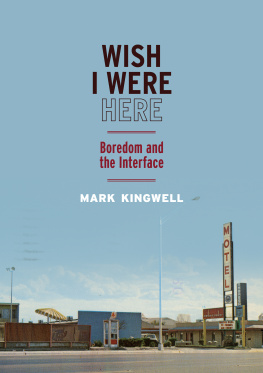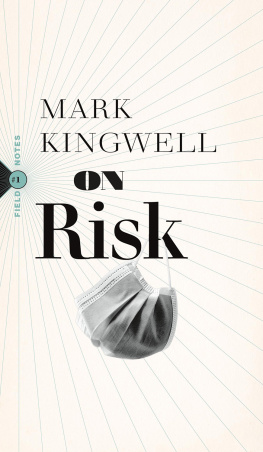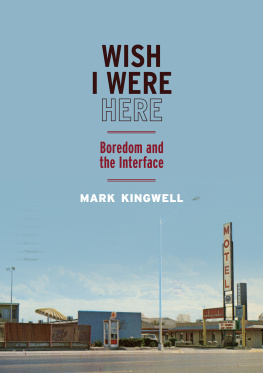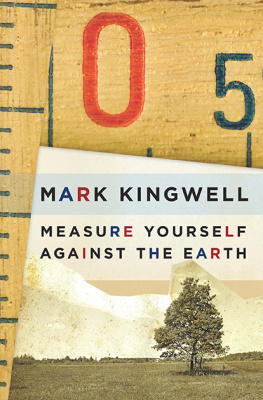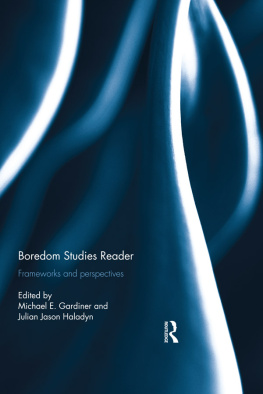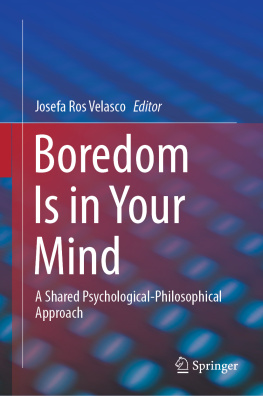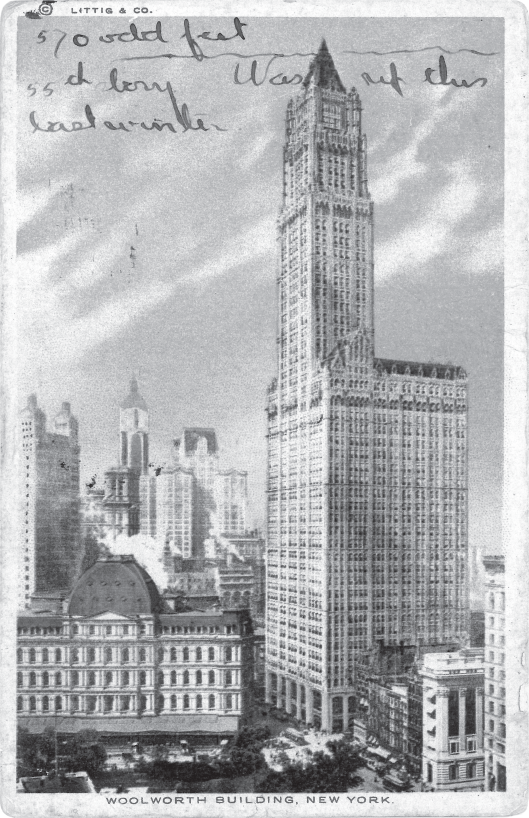
WISH I WERE HERE

Series editors: Adrian Parr and Santiago Zabala
Pointed, engaging, and unafraid of controversy, books in this series articulate the intellectual stakes of pressing cultural, social, environmental, economic, and political issues that unsettle todays world. Outspoken books are disruptive: they shake things up, change how we think, and make a difference. The Outspoken series seeks above all originality of perspective, approach, and thought. It encourages the identification of novel and unexpected topics or new and transformative approaches to inescapable questions, whether written from within established disciplines or from viewpoints beyond disciplinary boundaries. Each book brings theoretical inquiry into a reciprocally revealing encounter with material realities and lived experience. This series tackles the complex challenges faced by societies the world over, rethinking politics, justice, and social change in the twenty-first century.
Wish I Were Here
Boredom and the Interface
Mark Kingwell
WISH
I WERE
HERE
Boredom and
the Interface
MARK KINGWELL
McGill-Queens University Press
Montreal & Kingston London Chicago
McGill-Queens University Press 2019
ISBN 978-0-7735-5712-3 (cloth)
ISBN 978-0-7735-5793-2 (ePDF)
ISBN 978-0-7735-5794-9 (ePUB)
Legal deposit first quarter 2019
Bibliothque nationale du Qubec
Printed in Canada on acid-free paper
This book has been published with the help of a grant from the Canadian Federation for the Humanities and Social Sciences, through the Awards to Scholarly Publications Program, using funds provided by the Social Sciences and Humanities Research Council of Canada.
We acknowledge the support of the Canada Council for the Arts, which last year invested $153 million to bring the arts to Canadians throughout the country.
Nous remercions le Conseil des arts du Canada de son soutien. Lan dernier, le Conseil a investi 153 millions de dollars pour mettre de lart dans la vie des Canadiennes et des Canadiens de tout le pays.
Library and Archives Canada Cataloguing in Publication
Kingwell, Mark, 1963, author
Wish I were here : boredom and the interface / Mark Kingwell.
(Outspoken)
Includes bibliographical references and index.
Issued in print and electronic formats.
ISBN 978-0-7735-5712-3 (hardcover).ISBN 978-0-7735-5793-2 (ePDF).
ISBN 978-0-7735-5794-9 (ePUB)
1. TechnologyPhilosophy. I. Title.
T14.K56 2019601C2018-906525-7C2018-906526-5
It cant be helped: boredom is not simple. We do not escape boredom (with a work, a text) with a gesture of impatience or rejection. Just as the pleasure of the text supposes a whole indirect production, so boredom cannot presume it is entitled to any spontaneity: there is no sincere boredom: if the prattle-text bores me personally, it is because in reality I do not like the demand. But what if I did like it (if I had some maternal appetite)? Boredom is not far from bliss: it is bliss seen from the shores of pleasure.
Roland Barthes, Le Plaisir du texte (1973)
CONTENTS
PREFACE
A certain amount of boredom is essential to a happy life.
Bertrand Russell, The Conquest of Happiness (1930)
In 1999 the English artist Martin Parr published a book that became an unlikely bestseller and coffee-table or desk essential. Boring Postcards was exactly what its title promised: a chunky album of 160 images drawn from Parrs personal collection of the dullest imaginable scenes and features of British life. Unremarkable railway stations, brick-faced factory buildings, empty interiors, motel rooms, hotel lounges, sad post offices, and bleak stretches of motorway all found a place in this eerie celebration of the mundane and vapid. Many people found the book hilarious; some considered it sad. Nobody seemed to find it at all boring on the contrary, in fact.
And yet, the images within the covers most certainly are of dull scenes and insignificant structures, however useful in achieving the ends of ordinary life. For me, as for many others, the book seemed at once revelatory and familiar. Like other examples of found art or aesthetic repurposing of ordinary things, it offered what Arthur Danto has called the transfiguration of the commonplace. We see here the banality of so much of the built environment, as well as the poignancy of our need to connect and communicate. Why would anyone, we wonder, choose a parking lot or a turnpike entrance as the subject of a picture postcard? Humans are visible in some of the scenes, but many of them are blank of life, neutron-bombed scenes of empty everydayness. They illustrate the tedium of daily life even as they play with the fashionable notion of folk photography the repositioning of trivial images to shine a bright light on their routine but profound longing. Parr added no commentary or theory, simply allowing the images to speak for themselves.
When Parr added a companion volume of American postcards in 2000 (Boring Postcards USA) and of German ones in 2001 (Langweilige Postkarten), the project ascended to new heights. Now vaster highways, toll booths, airports, border crossings, high-rise apartments, empty swimming pools, and suburban subdivisions joined the array of vapid surroundings. Flipping through these books, especially Boring Postcards USA, creates a visual version of the road-trip sections of Nabokovs Lolita (1955), in which Humbert Humberts sour catalogue of neon-lit roadside diners, chain groceries, burger stands, gas stations, and motels becomes a mounting polemic against postwar America and its vacuous, enervating prosperity. Parr is never so judgmental. Once again there is a celebratory feeling to this collection, yet tinged with sadness. Having a great time, wish you were here! No, really I wish you were here, because being here without you means I am less than myself.
Postcards have been with us for a long time, but one of the most intense crazes for them came about a century ago, when it was extremely fashionable to send lithographed scenes of life on the road to friends and family left behind. One of my favourite pieces of ephemera is a postcard of the Woolworth Building in New York (1912), which I found some years ago in a New Hampshire barn. A wavy line of fountain-pen ink marks the pinnacle of the towering structure. Was up this last winter, the script notes for the information of those still on the farm. Even the hues of the early picture postcard become a familiar palette, of pale tones and comicbook print quality, such that later ones, from the 1970s on, have a glossy, lustrous finish that seems incongruous and somehow wrong.
A postcard is not merely an image, however, and that is one reason I have used postcards as a visual accompaniment to the text that follows. They tell a story of selfhood in search of itself. Postcards are elements within large systems of cities and towns and farms, of postal and printing services, of tourist trade and vacations, and of family, friends, and co-workers. The image is really just the occasion, or the carrier, for creating a tiny node of personal signal within the vastness of this web of collective and communicative action. The message on the back is likewise secondary to the fact of the postcards being sent. Indeed, as anyone who has browsed in a Sunday flea market will know, many postcards contained no written message at all, just an address. The sought-for connection was the real freight.
Next page
